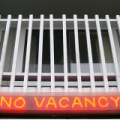$100 Businesses and Different Kinds of Entrepreneurship
Greetings, friends and readers. This week I’m holed up on the Oregon coast working on my book. Updates will continue as usual, starting with this weekend one where I write about the small business behind AONC.

Since I wrote about $100 businesses last Monday, I’ve heard a lot of fun stories from readers. First, this from Caitlin:
Sorry I missed your tweet asking for $100 business ideas. In grad school (public policy), I wandered over to the business school at University of Wisconsin to take a few entrepreneurship classes. The professor included a similar $20 challenge as a semester-long project for the class. I was the only person with a public policy background and immediately sought to capitalize on the 2004 presidential election. As soon as the professor had handed over $20 in cash to each of us at the end of class, I set off to launch my ‘Political Pastries’ idea.
I sold several flavors – Cherry Kerry, Nutty Nader, Blueberry Bush, Anarchy Apple and Pundit Pumpkin. I made four pecan pies (Nutty Naders at $5 investment each) and sold them for $15 each. The resulting $60 helped me fund the making of more pies. I sourced a professional kitchen from my neighborhood pizza shop with the provision that I only use the shop in the early hours of the morning and that I take a small amount of freezer space. I saw peak demand for my product when the Thanksgiving holiday coincided with the last days of the presidential election.
I was up to my eyeballs in all purpose flour that semester, and I learned two important things:
1. Butter is best with pie crust, despite the virtues of Crisco that others had extolled during my very short market research phase, and
2. Starting a business does not take that much money at all. This was the most important lesson – all it takes is a feasible and good idea and a willingness to work hard and smart.
The student in class with the best ROI generated by his or her business idea saw his or her name engraved on a plaque in the business school. My name is up there, much to the disbelief of my policy school professors.
All the best,
Caitlin
***
Different Kinds of Self-Employment
I like hearing stories like Caitlin’s because it reminds me that entrepreneurship can mean different things to different people. One of the questions I hear a lot is whether “self-employment for life” was an intentional strategy for me or whether it just naturally happened.
My answer is that I slowly gained an appreciation for entrepreneurship as a force for good in the world. In the beginning, I just wanted to find a way to support myself without working for someone else. It also helped that I wasn’t good at the few part-time jobs I held. I craved freedom, and needed to find a way to get it. What could I do to create freedom for myself? How could I sell pies like Caitlin did?
That’s why I think there are different kinds of entrepreneurship:
1. Just getting started. This was me in the early years. I just wanted to find a way to be responsible for myself, and I found that it wasn’t that difficult. The Working for Yourself guide goes into much more detail, with the goal of helping everyone who reads it to start a new project that earns at least $250 a month. You can’t quit your day job on $250 a month, of course, but being able to earn a small, regular amount of money can be very empowering.
2. Small-to-medium. This is when you want to go from a small ($250-$1,000 a month) project to a bigger ($5,000-$20,000 a month) project. Working for Yourself also helps with this, although in a more limited form. Because I’m also interested in the small-to-medium transition and have done it a few times, my first business project of 2010 will be all about building your own empire by doing one thing every day.
3. Building a big business. I also respect entrepreneurs who go on to such levels of innovation that they end up building a big company with a large group of employees and multiple business arms. Since all of my experience is at small and medium levels, though, I don’t know a $58 guide to help with that process. Maybe Richard Branson, Bill Gates, Steve Jobs, or Oprah will write one for us.
***
Free $100 to Start a $100 Business
Lastly, if you live in the U.S., you can get a free $100 from Bank of America or Chase to start your business (or for anything else you want). Details are here for Bank of America and over here for Chase. International readers, sorry– the $100 bonus is U.S.-only. You’ll have to earn your $100 another way.
Wherever you are, I hope all is well with you. I’m off to do some book-writing.
###
Oregon Coast Image by ChrisFry







